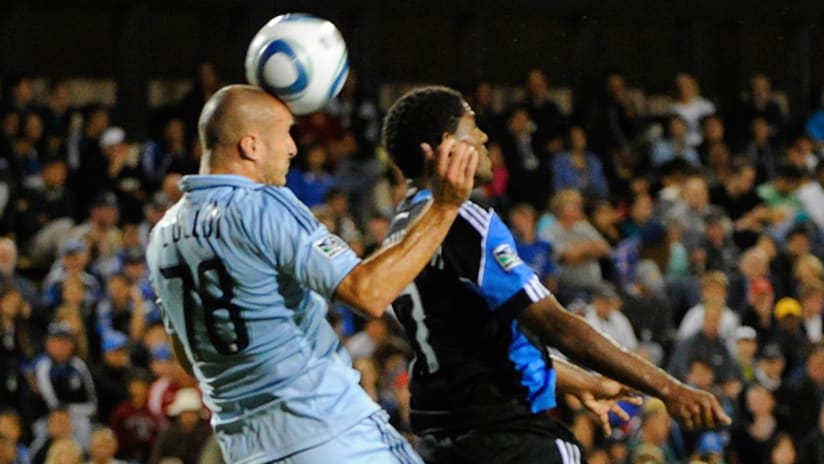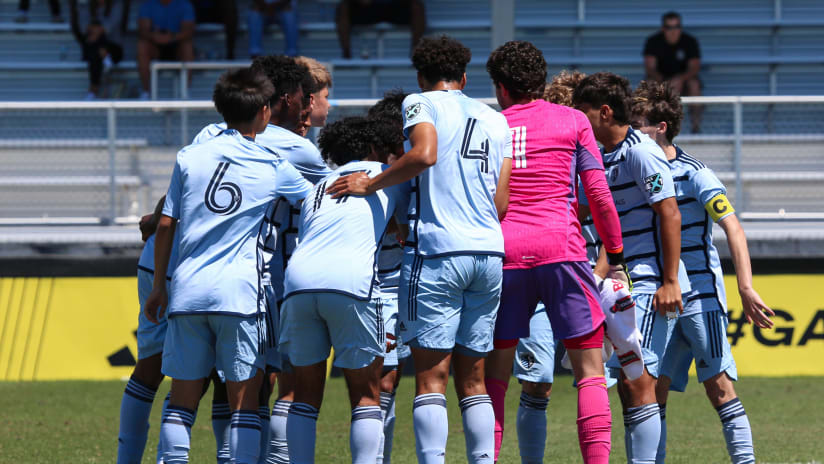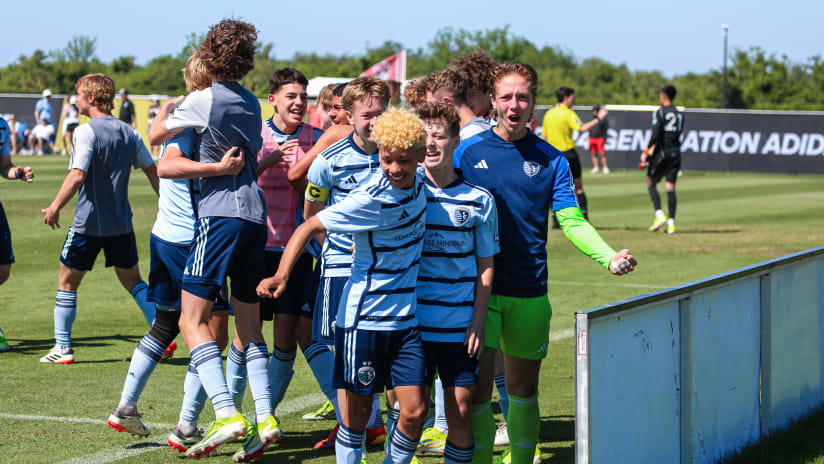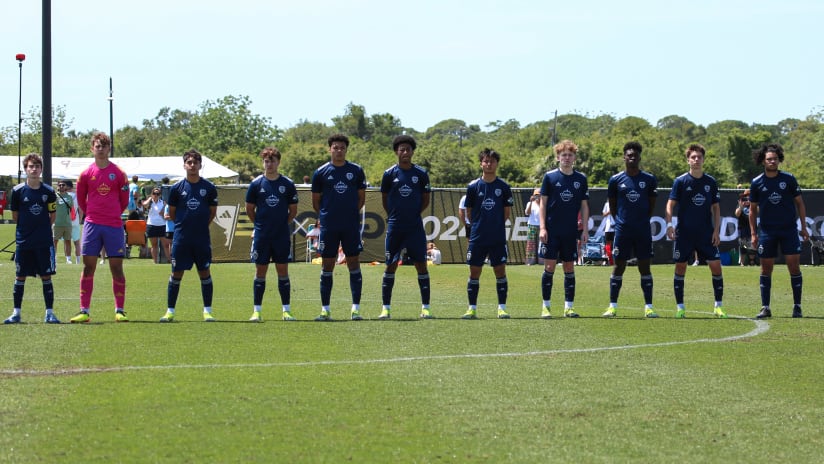Aurélien Collin takes a sip of his cappuccino and a quick glance around the half-full coffeehouse. His face is a picture of contentment.
This is home – not just the coffeehouse, not just the vibrant Westport district, not just Kansas City. America is home now, Collin's last stop, he hopes, on a soccer odyssey that began on the streets of the Paris suburb of Enghien-les-Bains.
He has a steady paycheck, playing the game he loves for a team that is among Major League Soccer's best. In his second season with Sporting, the MLS All-Star has made a name for himself as one of the league's top center backs – physical, risk-taking and with a flair for the big play. He has begun to map out a future beyond the game, studying online for a fashion degree.
“I'm happy,” Collin tells MLSsoccer.com in a quiet sitdown interview. “I'm blessed. Everything is going well. I'm healthy. The team has already won the US Open Cup, the first title of my career. Thank God, everything is good.”
How good? Collin is happy to continue his list.
“I've never played for a club like Sporting KC,” he says. “I've never played in a stadium like Livestrong Park. I've never played in front of fans like these.”
But Collin's American dream might not yet be fully realized. He can see himself raising his hand to take the Oath of Allegiance as a new American citizen – and, sometime after that, pulling on the red, white and blue kit of the US national team.
“I have my green card already,” he says. “Maybe I will get to play for America someday.”
To understand why Collin loves the space he's in right now, you first have to understand where he was before – and the twisting, often grueling route he took to get here.
The thing was, the call from Sporting wasn't for him – not at first.One club wouldn't play him. Two more couldn't pay him on time, or at all. Yet another just, well, went away on him. So when he learned of an opportunity to play in a stable league, in the country that had long called to him anyway, he answered.
Collin was playing for Portuguese side Vitória Setubal, and waiting months for his paychecks, when he first caught a glimpse of the MLS lifeline. His path to America opened up through a roundabout connection to Sporting assistant Kerry Zavagnin.
“One of my friends who used to play for Benfica was on loan to Setubal,” he says. “A guy who knew Kerry got in touch with him. We were roommates, very close friends. He says, 'Oh, that guy wants me to go to America. I don't want to go there.' I says, 'I do.'”
Collin impressed Sporting enough to earn a contract offer, but it took a while for him to obtain his release from the Portuguese side.
“They didn't want to let me go just like that, even though in the eyes of the law I was able to go,” he says. “They did everything they could to slow me down. But in the end, I came, and here I am.”
Vitória Setubal wasn't the only club that failed to make good on its financial obligations, Collin says. The paychecks from Greek side Panserraikos, the second stop on his six-nation European journey, were also slow or nonexistent.
So while MLS' single-entity structure, with no promotion and relegation, doesn't allow perennial powerhouses to dominate for years, it also offers its players a financial stability that many European systems don't.
“In Greece, there are two clubs with money,” Collin says. “In Portugal, three clubs. In Spain, two clubs. America is the only place, for me, that every team competes with every other team. Every team has the same salary cap, and that makes the competition higher.”
Collin didn't set out to be a football nomad, though. Like so many soccer-mad French kids, he dreamed from an early age of making it big in his home country.
“There's a picture of me, two or three years old, with this big ball of soccer,” he says. “We were playing every day, in the streets, and I knew when I was young that I wanted to be a professional soccer player. I have worked all my life to make this come true, first in Europe and now in America.”
“It's determination,” he says. “When I see something I want, I have to go get it.”Learning the game in the streets forced Collin to get tough – and creative – early. If he sometimes comes forward into Sporting's attack as though the No. 78 on his shirt has somehow turned into a No. 10, it's because that's how he learned the game from the outset.
Collin took the first steps to getting what he wanted close to home, joining the youth programs of Sedan and then Amiens. At the same time, though, America was never far from the forefront of his mind.
“I grew up with the American dream,” he says. “I grew up listening to American music, American hip-hop, watching American movies. It was always there.”
That would have to wait, though. First, he had to find a club that would put him on the pitch.
“Amiens, I was there for one year,” he says. “I never got into one official game.”
Out of that frustration came a decision: “France is not for me.” And that, Collin says, is why, after all these years, he would consider the Yanks ahead of Les Bleus.
“France never helped me,” he says. “If I have to choose, maybe I choose to play for America and not France.”
Leaving Amiens, Collin signed a youth contract with Spanish club Mallorca. From there, it was a quick jump to what should have been his first big break.
In 2007, he inked a two-year deal with Gretna of the Scottish Premier League – not one of Europe's top circuits, but one with enough history that Collin thought he had found a stable home.
But after Collin's first season there, the club first went into administration, and then was liquidated outright in August 2008 when owner Brooks Milleson's ill health forced him to pull his backing.
“I think that was the first time that happened in Scotland in history,” Collin says. “It was crazy. But the conditions were so bad that you knew if something happened to the president the club was going to have a lot of problems. The facilities were like a seventh-division team. We didn't even have our own stadium. We played in Motherwell's stadium. ”
Unsuccessful trials with several English sides followed before Collin signed with Panserraikos. He was gone from Greece after one season filled with missed paychecks, and landed at Wrexham, who are in Wales but compete in the English pyramid. He arrived there just after the club had fallen out of the Football League into the fifth-tier Conference National, and left for Portugal after just 12 games.
More financial struggles followed, and Collin began looking for a way out.
“I never received any bonus,” he says. “The salary was always late – two months, three months. I never received any money for my house, my car. So you're always playing with depression, you know, and the facilities were very bad. Even if the facilities are bad, it can be OK if someone is there being professional with you, pushing you to get better. That wasn't happening.”
“I always wanted to be the best,” he says. “As soon as I turned professional, I wanted to play with the best teams in Europe. I was not patient. But the struggles kept me moving. I always wanted to work harder than everybody. I had to go through a lot of countries with some not very good teams. But the important thing is what I'm still going to achieve.”And that's when Sporting reached out to Collin's friend – and found him instead. He hasn't looked back. And while he's glad his struggles in Europe are over, Collin also appreciates the lessons they taught him – chiefly, patience and perseverance.
Collin pauses, smiles.
“We will talk about that in a few years.”
And if the rest of his career finds him in Sporting blue?
Another smile.
“If the club does what it has to to keep me,” he says, “I will be the happiest man in the world.”





